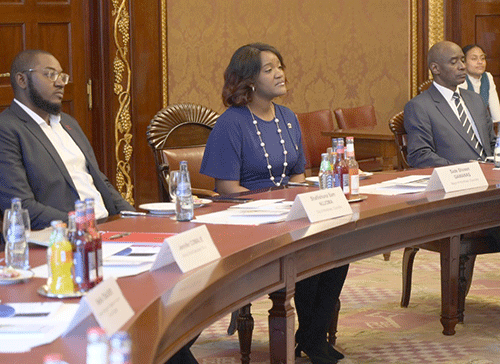The mayor of the City of Windhoek Sade Gawanas last week travelled to Bremen, Germany, to strengthen and deepen their collaboration on the implementation of solid waste management.
Gawanas was accompanied by acting CEO Jennifer Comalie, Swapo councillor Sam Shafiishuna Nujoma, Solid Waste Management Division official Stellio Tsauseb and the head of international relations and networking Christopher Eita.
She told New Era their trip was necessitated by the fact that as part of the agreed project implementation schedule, the first activity is the exchange working visit from Windhoek to Bremen.
“Although the implementation involves mainly technical activities, the participation of elected leaders is emphasised to provide political impetus to the cooperation activities,” she said.
The mayor said the two cities, Windhoek and Bremen, have been cooperating since 2000, building on the long historical relationship that includes support for the struggle for Namibia’s independence by the people of Bremen.
The cooperation is built on the signing of a charter agreement on the local Agenda 21 in 2000 – and built on a commitment that through knowledge and creativity, we can develop a stable lifestyle for the future, planning and administering our cities with the aim of sustainability and respect for the environment.
“The cooperation prioritised solid waste management, wastewater management, sustainable urban tourism, the provision of basic sanitation to informal settlements of Windhoek and the streamlining of climate change in all municipal services,” she said.
In January this year, Gawanas signed an agreement with her counterpart from Bremen, mayor Andreas Bovenschulte, to implement a project to improve solid waste management in Windhoek.
The project is funded by the European Union to the tune of N$36.8 million.
The main objective of the project is to reduce waste volumes and harmful environmental impacts – and thus, to expand the share of recycled waste along with the creation of jobs through innovative start-ups in the circular economy in Windhoek.
Overall, in the coming months, there will be several exchanges between waste management experts of Bremen and Windhoek.
Moreover, workshops and educational measures for school children will be arranged in Windhoek, and recycling stations will be established.
As a further measure, an incubator for start-ups in the circular economy sector will be set up in Windhoek, therein enabling young people to test new and innovative business ideas – and to fulfil their dream of establishing a company.
According to Gawanas, in October 2017, the two partner cities joined the municipal climate partnership project at a kick-off workshop in Bremen.
“This partnership will continue the tradition of sharing knowledge and inspiring creativity through enlarging each other’s horizons and working together on solutions. The climate partnerships projects have been receiving support from a strong base of multi-sectoral development partners, including universities, public institutions and civil society, and providing a rich variety of services to enhance the quality of life in the two cities,” she indicated.
The mayor said the spirit of cooperation is one that embraces effective consultation and engagement across various levels of our communities at all stages of projects under the partnership.
“The success of the partnership is built on mutual trust and respect, and a productive-sister-city working relationship. We acknowledge the generous support that the partnership between our two cities received over the years from the German Federal Ministry of Economic Development and cooperation,” she emphasised.
– ljason@nepc.com.na


